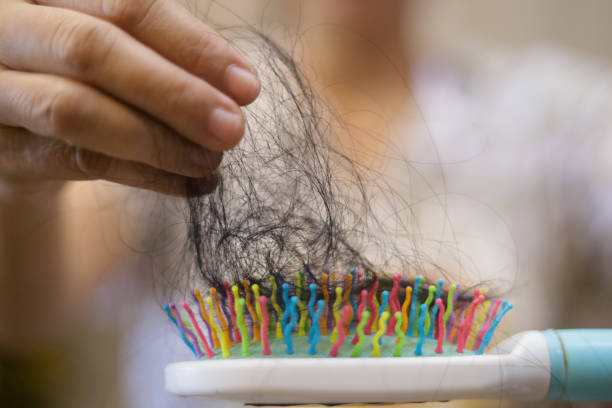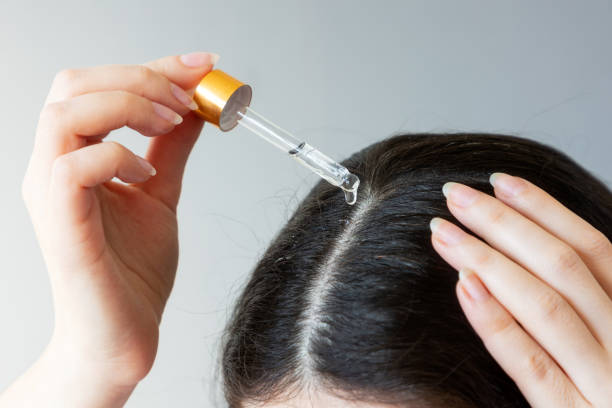Hair Loss: Causes, Treatment and Tips to Maintain Your Hair

Hair loss, the problem we all love to hate! It seems that your hair has decided to “quit” work suddenly without giving any prior notice. Is it genetic? Or is it affected by daily stress? Maybe it just wants a seasonal vacation! Here we will discuss the causes of hair loss to find out the answer and look at hair loss treatments.
The truth is, sometimes hair loss is natural – just like birds abandoning their nests at the end of the season. But other times, your hair may be trying to tell you a coded message: “Help me!” Whether it’s due to hormonal changes or external factors, there’s no need to panic. Because we all know that hair can fall out, but confidence? It’s impossible to shake! Haircuts for men according to face shape can help you regain that sharp, fresh look while managing hair loss with style.
is hair loss normal
Hair loss is considered normal and part of the hair growth cycle, as the scalp loses about 50 to 100 hairs per day. These hairs are replaced by new ones, which makes it not a cause for concern. Temporary factors such as changing seasons or pregnancy may also lead to a slight increase in the rate of loss.
Causes of hair loss
Hair loss can be attributed to a variety of factors, some of them:
1- Genetic Causes:
Genetic factors are one of the primary contributors to hair loss, commonly referred to as hereditary baldness. This condition tends to manifest at certain life stages and runs in families, over time it gradually thins hair across all genders – men have receding hairlines or patches while in women it leads to overall thinning.
2. Environmental Factors
Environmental factors have an immense effect on hair health. Pollution, chemical exposure and excessive sun damage all pose major threats to its integrity while inadequate diets deficient in iron, zinc and B vitamins can wreak havoc with your scalp’s nutrients resulting in further hair thinning.
3. Health Issues
Chronic illnesses, like diabetes or thyroid conditions, may disturb hair growth cycles and deficiencies of key vitamins like iron and Vitamin D may play a part in leading to loss.
4. Lifestyle Factors
Stress and anxiety can both negatively impact hair health in ways that negatively influence it, while poor haircare habits – using harsh products or combing incorrectly can result in long term loss of locks.
Does Dandruff Cause Hair Loss?
Dandruff may not cause hair loss directly. however, repeated itching and scalp irritation caused by itchy dandruff may weaken hair roots over time and lead to eventual hair shedding.
does creatine cause hair loss
There is no strong scientific evidence that creatine directly causes hair loss. Some studies suggest it may increase DHT (a hormone linked to hair loss in genetically predisposed individuals), but this effect is not conclusive. If you’re concerned, consult a healthcare professional.
When is hair loss dangerous
Hair loss becomes a concern if it exceeds the normal rate or is accompanied by additional symptoms such as:
- Sudden increase in hair loss: when seeing large amounts of hair on the pillow or while showering.
- Appearance of hairless spots: especially on the scalp or face.
- Noticeable hair thinning: where the hair becomes unexpectedly thin.
- Scalp problems: such as severe itching, inflammation or thick flakes.

Types of hair loss
The types of hair lossing vary between:
- Temporary Vs Chronic Hair Loss:Temporary hair loss may result from external factors like stress or pregnancy, while chronic loss often stems from hereditary issues like hereditary baldness which cannot be solved overnight.
- Telogen Effluvium and Hereditary Baldness: Telogen effluvium may occur as the result of extreme stress or hormonal shifts, hereditary baldness runs in families genetically.
- Alopecia Areata and Dermatological Conditions: Alopecia Areata (AIA), is an autoimmune condition wherein immune system cells attack hair follicles which then results in hair shedding. Sometimes infections of the scalp also play a part in leading to this hair thinning condition.
How to stop hair loss?
There are several ways to prevent and reduce hair loss, including:
Optimizing Diet and Nutrient Intake (ADI):
One of the most important ways to prevent hair loss is to improve your diet. Eating foods rich in vitamins and minerals such as iron, zinc, and vitamin D can help promote healthy hair.
Proper Hair and Scalp Care:
Wash using suitable shampoos, using minimal heat styling techniques and staying away from harsh chemicals are key steps toward proper scalp and hair health care.
Stress Reduction:
Engaging in relaxation techniques like meditation or exercise to manage our stress will promote better hair health.
Hair loss treatments
You can treatment the loss by:
1. Medical Solutions
- Topical medication such as minoxidil:
Minoxidil is one of the most effective remedies available for hair treatment. It stimulates new hair growth on areas affected by hair loss. - Hormone therapy and hair transplantation:
If a problem involves hormone imbalance, hormone therapy might be required in some instances to combat hair thinning and restore density. In extreme cases, hair transplantation might also be considered in order to restore density.

2. Natural Solutions
- Using natural oils and herbal ingredients: Natural oils such as castor oil and olive oil can help promote healthy hair. Herbs such as fenugreek may also be effective in stimulating hair growth.
- The importance of scalp massage: Regular scalp massage is one of the methods that helps improve blood circulation and increase the supply of nutrients to hair follicles, thus increasing hair density.
Best Foods to Support Hair Growth
Nutrition plays a crucial role in strengthening hair health. Eating the following foods helps strengthen hair follicles and promote hair growth:
- Eggs provide ample sources of protein and biotin that support hair health;
- Spinach/leafy greens provide iron/vitamin supplements which nourish scalp health;
- Nuts and Seeds: Packed with omega-3 fatty acids and zinc for stimulating hair growth, they make great additions to our daily diets.
- Fatty Fish like Salmon is often recommended to improve hair density and strength.
- Fruits Rich In Vitamin C Like Oranges or Strawberries Will Also Contribute
- Carrots contain vitamin A which promotes scalp health.
- Whole Grains provide essential zinc and iron essential to improving hair quality.

Hair loss can be the result of genetics, environmental influences and health conditions; by understanding its sources and leading a balanced life they can reduce or prevent future episodes of shedding. Maintaining optimal nutrition levels, stress reduction strategies and treatment can go far in supporting strong, vibrant locks.
References:
- WebMD: Hair Loss Causes and Treatments
- American Academy of Dermatology (AAD): Types of Hair Loss
- Mayo Clinic: Hair Loss Overview
Read more:
The 4 most important natural masks to lighten the skin
